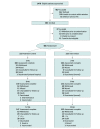Mobile Critical Care Recovery Program for Survivors of Acute Respiratory Failure: A Randomized Clinical Trial
- PMID: 38289602
- PMCID: PMC10828910
- DOI: 10.1001/jamanetworkopen.2023.53158
Mobile Critical Care Recovery Program for Survivors of Acute Respiratory Failure: A Randomized Clinical Trial
Abstract
Importance: Over 50% of Acute Respiratory Failure (ARF) survivors experience cognitive, physical, and psychological impairments that negatively impact their quality of life (QOL).
Objective: To evaluate the efficacy of a post-intensive care unit (ICU) program, the Mobile Critical Care Recovery Program (m-CCRP) consisting of a nurse care coordinator supported by an interdisciplinary team, in improving the QOL of ARF survivors.
Design, setting, and participants: This randomized clinical trial with concealed outcome assessments among ARF survivors was conducted from March 1, 2017, to April 30, 2022, with a 12-month follow-up. Patients were admitted to the ICU services of 4 Indiana hospitals (1 community, 1 county, 2 academic), affiliated with the Indiana University School of Medicine.
Intervention: A 12-month nurse-led collaborative care intervention (m-CCRP) supported by an interdisciplinary group of clinicians (2 intensivists, 1 geriatrician, 1 ICU nurse, and 1 neuropsychologist) was compared with a telephone-based control. The intervention comprised longitudinal symptom monitoring coupled with nurse-delivered care protocols targeting cognition, physical function, personal care, mobility, sleep disturbances, pain, depression, anxiety, agitation or aggression, delusions or hallucinations, stress and physical health, legal and financial needs, and medication adherence.
Main outcomes and measures: The primary outcome was QOL as measured by the 36-item Medical Outcomes Study Short Form Health Survey (SF-36) physical component summary (PCS) and mental component summary (MCS), with scores on each component ranging from 0-100, and higher scores indicating better health status.
Results: In an intention-to-treat analysis among 466 ARF survivors (mean [SD] age, 56.1 [14.4] years; 250 [53.6%] female; 233 assigned to each group), the m-CCRP intervention for 12 months did not significantly improve the QOL compared with the control group (estimated difference in change from baseline between m-CCRP and control group: 1.61 [95% CI, -1.06 to 4.29] for SF-36 PCS; -2.50 [95% CI, -5.29 to 0.30] for SF-36 MCS. Compared with the control group, the rates of hospitalization were higher in the m-CCRP group (117 [50.2%] vs 95 [40.8%]; P = .04), whereas the 12-month mortality rates were not statistically significantly lower (24 [10.3%] vs 38 [16.3%]; P = .05).
Conclusions and relevance: Findings from this randomized clinical trial indicated that a nurse-led 12-month comprehensive interdisciplinary care intervention did not significantly improve the QOL of ARF survivors after ICU hospitalization. These results suggest that further research is needed to identify specific patient groups who could benefit from tailored post-ICU interventions.
Trial registration: ClinicalTrials.gov Identifier: NCT03053245.
Conflict of interest statement
Figures


References
Publication types
MeSH terms
Associated data
Grants and funding
LinkOut - more resources
Full Text Sources
Medical
Miscellaneous

